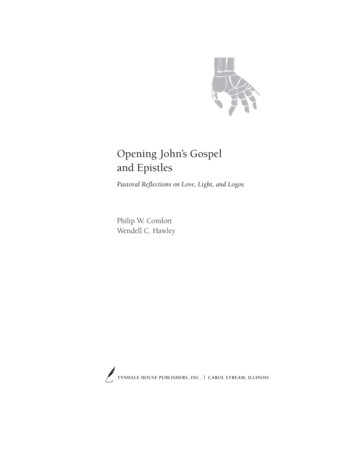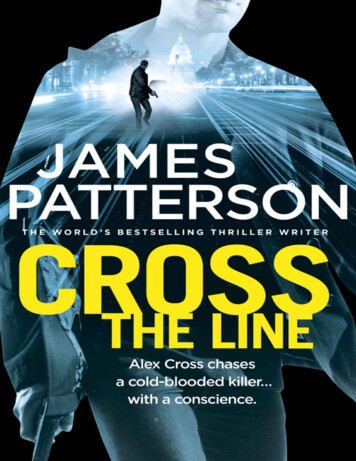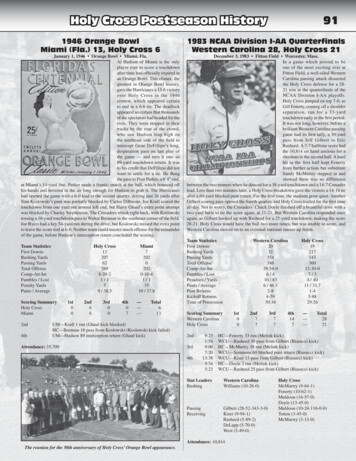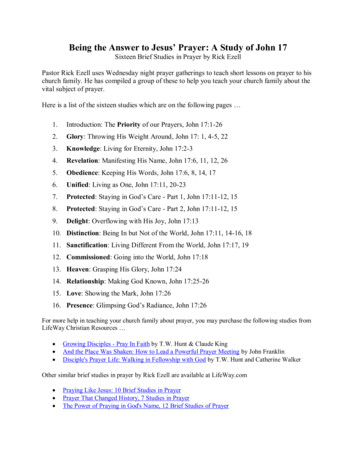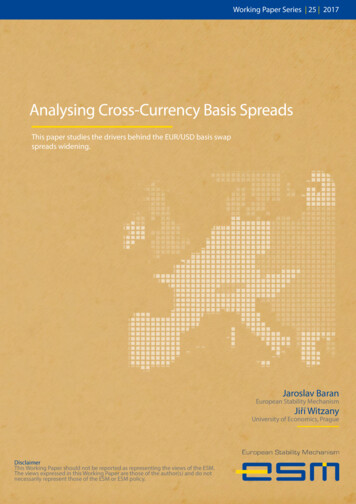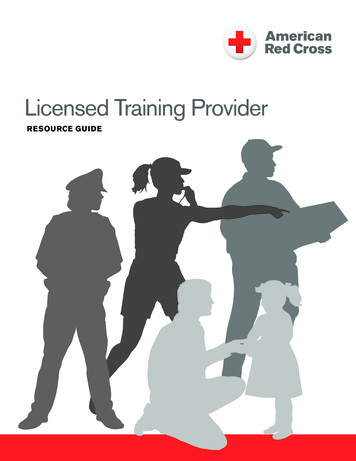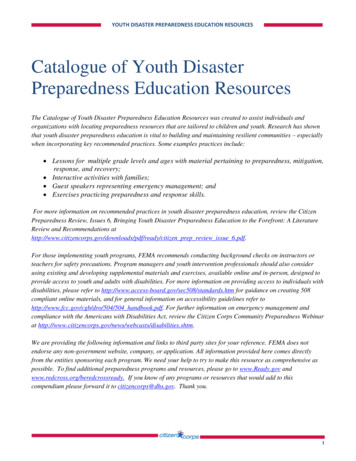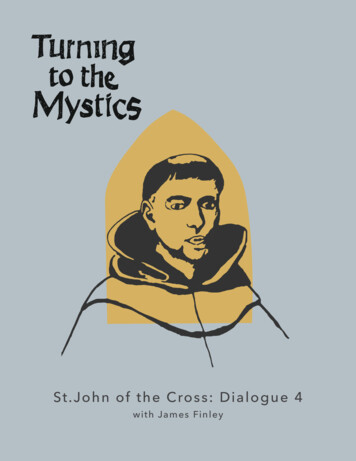
Transcription
St . J o h n o f t h e Cro ss: Dia lo gue 4with James Finley
Jim Finley:Greetings. I’m Jim Finley.Kirsten Oates: And I’m Kirsten Oates.Jim Finley:Welcome to Turning to the Mystics.Kirsten Oates: Welcome everyone to our dialogue on Session Five, Turning to the Mystics. Jim, good to bewith you.Jim Finley:Yes, good to be with you. Yeah.Kirsten Oates: So in Session Five you did something a little different. You didn’t do your normal lectio. Infact, there was no text from John of the Cross in the episode. You did more of a meditativereflection. Could you just talk us through why you went in that direction?Jim Finley:Yes. There’s a previous session, that chapter, it was so deeply poetic. We thought it would bebetter if you and I went through it together as a dialogue because the goal here is to makethese teachings as accessible and understandable as possible. So with that in mind, with TheDark Night, I thought it would really be helpful to see how. We’ve all experienced a darknight because the dark night is kind of a metaphor, a visual metaphor of the transformativedeepening of love.Jim Finley:So I thought if we could see how The Dark Night as that metaphor works in our love foreach other, as between husband and wife, and then by implication between parent and childor teacher and students or people committed to help others with healing or to living aloneor to being old or being one with the earth, any modality of love that calls us to a yet deeperlove, how is The Dark Night part of that transformative process? And suggesting, and thisis what we looked at in marriage then as an example, suggesting that first a dark night isactually a brightness that blinds our eyes and that we’re living in a certain level of love. Andthen we’re graced with an awareness of a yet deeper love that’s so deep we can’t comprehendit. That as it overwhelms us or touches us or reaches us, but we don’t know what to make ofit.Jim Finley:In that sense, it’s a dark night by the very luminosity of our inability to grasp it from wherewe presently are. The dark night then takes on a different meaning, in which once we’ve gota glimpse of that brighter light and our eyes get adjusted to it, then we see that our presentlevel of love is a dark night and it’s a kind of a darkness because it’s a deprivation of thedeeper light of love that we’ve been graced to experience. And then we see we want to thenmove into that brighter, but we want to stabilize in it and we want to leave behind that lesserdegree of love, because now we’ve seen something that’s richer.Jim Finley:And then the dark night comes that we’re attached to the lesser love. We’re attached to itbecause these are patterns of the mind and heart. And it has to do with issues of controlabout not knowing how to leave them behind. And so we need to do love’s work tocourageously link beyond our present comfort levels into the bright light. And then as westabilize in that, then a new wave it starts all over again, then there’s another wave of love.And that goes on over and over and over. So it keeps refining us and refining us over time.So I was saying this, if we could see how this works in married love, then we could see how itworks in parenting, or with the artist or the poet or the teacher or the healer or the person in2
sobriety or the personal lives alone, any deepening of a love and the foundations of life itself.Jim Finley:The dark night is a poetic metaphor that gives us a language for that, because if we could seeit in each other, then we’ll return back to John of the Cross to see in the same continuousway, how does it go on between us and God on the dark night within this infinite love? Sothat was the logic for that session opened to help the listeners see that.Kirsten Oates: Yeah. And it was very helpful. So I appreciate. And that explanation you just gave us a greatsummary. And I do want to repeat some things back because I think you’ve just provideda lot of clarity for us. So the dark night is about the deepening of love and how we mightexperience the deepening of love.Jim Finley:That’s exactly right. Yeah.Kirsten Oates: And then I noticed last week and you said it again, there’s these two aspects to the way lovedeepens. One is that we sense the deeper love and it’s so bright we go into a dark night, we’reblinded by it.Jim Finley:It blinds us, that’s right.Kirsten Oates: Then on the second side of it, there’s the dark night of longing for that loves, so fleetinglyglimpsed to use your words. And does that dark night feel more like a longing? [crosstalk00:05:37]Jim Finley:Yes, exactly. It’s a longing to abide in the depths of fleetingly glimpse as it grazes us, thenhaving experienced it, having tasted it, then we long to abide in it. But the night is we don’tknow how to abide. We need help from love to follow loves promptings to do that. Yeah.Kirsten Oates: That’s so helpful. It’s just a great rubric, I think, to then apply to these different kinds ofloves, which I’m hoping we can take some time to do a couple of different examples in thisepisode. In the previous episode you said whenever there is love, there is God.Jim Finley:Yeah.Kirsten Oates: And I wondered. I think it’s so hard to define love. So this sense that you’ve spoken aboutoven interior knowing, and then there’s the in between, the something in between.Jim Finley:Yes. This idea first in John and scripture that God is love. So it says, and therefore whereverthere’s love, there’s God. For the one who says he loves God and hates her brother says thatperson is a liar. So God is the infinite love that we experience and recognize in the loveamongst ourselves, that God is the infinity of that love. And so what is love? We might say,and just for John of the Cross is so beautiful and some of his poetic insights into this love,we might say that love is first I want to apply or the person sees the beloved, as they seeanother person. And they see within the person the goodness of the person, a deep goodness.And the will is drawn to unite itself or to be one with that goodness, or to seeing of a certaindepth of goodness or beauty. And then seeing that the love in us it sees that we see theperson through the eyes of love.Jim Finley:And then in seeing that, we’re drawn and we want to be one with that goodness. So John of3
the Cross says love produces likeness. So I can’t be one with a beloved unless I jointhe beloved in that goodness. So the very love for the beloved draws forth in me tobe faithful to the goodness in me. So the beloved and I can be one with each other inthe goodness of love that we see in each other. And then in that uniting of that, thenwe seek them to be there for and with each other in love. And this is where it getsspecifically in marital love. And this way John of the Cross these nuptial mystics, thisway they see marriage as the main metaphor for then they’re moved to give themselvesto each other.Jim Finley:Now, the teacher gives himself to the student, the doctor to the patient, to the personwho works with the poor. We give of ourselves because we see the goodness in them.But particularly in nuptial love, it’s a physical, emotional, complete donation ofoneself to each other in love. And then they sense in faith that their love for eachother sacramentalizes or embodies God’s love that led them to each other, and theyexperienced God’s love and their love for each other. And so those would be some ofthe parameters of lover, aspects of love.Kirsten Oates: Jim, that’s so helpful. And then what I’m hearing is whether it’s married love or thelove from the teacher or the doctor, that it’s this awakening to God’s love within itthat opens up on the infinite possibility of the love. Is that.Jim Finley:That’s exactly right. That we see then the God’s love is the love that gives us to eachother. It’s God’s love we see once the child emerges. But we express our love for Godin and through our love for our child, in and through our love for the beloved, in andthrough our love for the students, by loving the beloved by loving the students whoare loving God present in the student, present in the world and so on. And likewise,that applies to art, that the artist or the poet with the one given to art or poetry isreally moved by a love. They love poetry and they give themselves to the poetic andthey want to abide in the poetic. And then they want to offer it as a love offering ofwhat’s given to them.Jim Finley:The same with the artist visually. They see something immensely lovable in the floweror whatever it is and so they seek to surrender themselves over. They kind of channelthat beauty out onto the canvas, whatever, so that when we see they gift us with that.So it’s like they’re offering. So we need to find likewise living alone with all yourheart or being one with the earth. So we find that which moves us to love and to giveourselves to it in love. And the more we give, the more we get back. So the richnessof the love is the self donating love of going forward to be one with that whichwe recognize the goodness that draws us to the love so it becomes a love path, likemodalities of love.Kirsten Oates: Yes. And John of the Cross he is concerned about helping us find our way to theground of love, which is God, so that we might be in alignment or fidelity to the lovethat we’re built for.Jim Finley:Yeah, I think John of the Cross put it this way. And realize he’s writing specificallyculturally to the cloistered nuns and friars is a kind of a question of vocation thatapplies universally to everybody. He’s assuming what we’re saying here, that as he’s4
assuming that we realize God wants us to be an awake, present, engaged, caring,loving person, because God is love and to love God and so on. But what he’sconcerned about, then, where the dark night comes in is that when we take this toprayer, not that we find God’s love in the beloved, in the child, but we find God’s lovein God in prayer. And we find God’s love communicated to us first in our beliefs,through our faith, and through our constellations and through our insights andthrough our aspirations. So when we sit in prayer, this is how we grow in love. Andthen we carry that God’s love for us and our love for God and we carry it out into ourspouse, the child, the neighbor, whatever.Jim Finley:John of the Cross is talking about the dark night where we start getting blindedby a light in which. We’ll put another way, is that this is a way it goes with us onthis earth, the way we’re talking now. But when we pass through the veil of death,we’re going to pass beyond God’s presence mediated, or sacramentally embodiedin our thoughts, in our aspirations, in each other. And we’re going to crossoveran unmediated infinite union with infinite love in glory. He’s talking about whathappens when God decides not to wait until you’re dead to start communicatingto you unmediated love of God. And that blinds our finite eyes because it utterlyoverwhelms the finite ways of experiencing God’s presence as the beginning ofan infinite way of experiencing the infinite [inaudible 00:14:15]. So he’s offeringguidance in that.Jim Finley:So that’s his concern, but he sees it. This reflection that I shared on married love, ithelps a lot if we can see it first at that same transformative metaphor, the dark night isfully present in each other because it’s a continuum. It’s an unbroken enrichment ofthat which is fully in each other, is in crosses over, like really dying of love really. It’slike surrendering yourself over to love like there’s nothing left of you but love. Andthat’s what he’s offering guidance in. Those who in prayer feel themselves that that’sstarting to happen to them.Kirsten Oates: Yes. Yes, this brings us to the beautiful picture you gave us around the ocean, andbeing ankle-deep in the ocean. But the ocean is still the, even at ankle-deep, it’s stillthe infinite depth of love is giving itself away at every level of the ocean.Jim Finley:Yeah. So let’s say using that as the metaphor, let’s say at the level of ego consciousness,or the day by day ego consciousness of these mediations, we’re at the ocean, we’rekind of amazed by it. We’re ankle-deep. And it’s true we’re on ankle-deep, but if wehead out to deeper water, get plenty deep soon enough, where that deepening is aquantifiable, measurable deepening, one feet, two feet, 10 feet, 10 feet, 1,000 feet,10,000 feet, and so on. And that’s life in the ego consciousness that can be measured,and it’s real.Jim Finley:But what if poetically were saying that ultimately speaking, what if the ocean and it’shidden center, here the ocean becomes a metaphor for God infinite love? What if inhis hidden center is infinitely deep, like it’s an abyss, it’s a bottomless abyss of love?And what if the bottomless abyss of love is giving itself away whole and complete ineach incremental degree of entrance into it?5
Jim Finley:So even when you’re just ankle-deep, you’re already in water way over your head becauseyou’re already. And God will live and move and have our being. Spiritual consciousness isthe awakening of that. See? So it is that love moment when we were in that Merton sessions,turning to see a flock of birds descending. We’re seeing children in a moment they’re reallychildren. It flashes forth something boundary listen vast that’s intimate and unexplainable.And it’s like that.Kirsten Oates: What’s so challenging in listening to these talks is that beautiful metaphor of the ocean andhow we can switch out of the measuring problem solving mind and into the poetic senseof an infinite presence flowing through the ocean. And you can have that brief. My heartwarms or upticks a little bit as I think about that. So why can I just realize that now thatmakes sense? I feel it. One cannot be fully realized in my experience.Jim Finley:Exactly. But let’s say when we hear it, when we hear this evocative language, it soundsbeautiful, and we know is beautiful because it’s true. And so we’re momentarily kind of takenby the truth of it. But then four seconds later, it drifts away because we’re back to cell phonewent off. And for some people, that’s what it’s like. But what starts to happen with somepeople, and this is the spiritual path, the person says, “I wonder what I could do about that”especially if this fleeting moment is not a moment in which I intuit something more wasgiven to me. But I fleetingly glimpsed the bliss like nature the love that every moment reallyis. What is the path along which I could stabilize in the habitual underlined state of interiorquiet amazement and gratitude, which is the path. How do I do them?Kirsten Oates: And this sense that depth is always present, that we catch the momentary glimpse of, butyou use this line of how we skim over the depths of our own lives. It’s just our naturaltendency [crosstalk 00:19:10]. And the way I think our society operates to pushes us intobusyness and deadlines, and we’re a society that doesn’t make room for the depth of our ownexperience either.Jim Finley:I think that’s true. I mean, I think what the tradition teaches is that in one sense, that’s ournatural tendency. But that natural tendency is really the unnatural tendency, because thenatural tendency is the God given desire to abide in the depths. It’s destiny. So the wholemystery in Christian this image of original sin, that is a blight on the soul. But there’s thetraumatized capacity to abide, We’re exiled from it. The Buddha called it ignorance, Jesuscalled it blindness. You have eyes to see, but you don’t see. So we can kind of sense we’recaught up in it, but there’s something contrived about it. I mean, there’s something. I feelmore interiorly grounded if I could stabilize in the deeper place my soul longs to go. But it’selusive. That’s what these podcasts are about, that’s what the teachings are about. What isthis kind of very childlike, humble, patient attitude, and all sincerity, in which we have thedaily rendezvous with God, in this processing carry it through the day so little by little bylittle, it becomes more and more stabilized for us?Kirsten Oates: Yeah, beautiful. You talked about the nuptial love being taught across different traditions,not just in the Christian mystical tradition, but across other traditions as well.Jim Finley:Yes. Say in every world religion, each world religion has its own mystical lineage to it. Soin Judaism and Torah and the prophets, you have Kaaba law, Kabbalistic mysticism andJudaism. And in Islam, you have the Sufi tradition. And in Hinduism, you have Patanjali,6
the yoga sutras of the yogi namaste, this deep of realization. And in Buddhism, you haveseeking to realize what the Buddha realized on the night of his enlightenment, the outerpurity of the Dharma Field free of craving, free of delusion, free of reification, turning thingsinto thoughts as kind of the divinity of the phenomenal world. So in those traditions, someof the traditions are almost lined up with this love mysticism would be the Sufi tradition,Rumi, which is a love mysticism. And also Bhakti yoga, the Bhagavad Gita, the beloved.Jim Finley:And so you have this love mysticism in Hinduism, and love mysticism in Sufi. Then inChristianity later in this series, when we talk about Meister Eckhart, he sees it as mind, havea virginal mind. And I think the parallel there is in Buddhism, on emptiness in mind. Yousee love in Eckhart and in Buddhism. In Buddhism, it’s in the bodhisattva, and compassionis the body of emptiness. So both are always present. But Thomas Merton was very goodat seeing these affinities between his own mystical lineage as a mystical Catholic. And heinvited these dialogues with Abraham Heschel with the Muslims and so on, because hewanted those in their own tradition, that transcend their tradition through mystical unionthey recognize each other. And we have much to learn from each other about this abyss likelove at every moment and every breath like that.Jim Finley:Turning to the Mystics will continue in a moment.Kirsten Oates: I find that really exciting to hear the way we can be in an experience of kind of solidarityaround some of these truths with other traditions and learning from each other. I think that’sa great thing for us all to hold I our hearts.Jim Finley:Me, too. And when we’re talking in the Merton section, we’re talking about that. We saidthe world will not survive religious people based on tribal consciousness, because they’ll useit in the name of attacking and brutalizing each other, we see that. It’s a bit of those in eachtradition moved towards what’s deepest in their tradition, which is its infinite union. Theyconverge at the center and recognize each other. So they would speak with one voice. It willbe a powerful unity message to the world. And CAC, the living school and so on is verymuch in concert with that.Kirsten Oates: Yes. Even though these mystics use nuptial love as the metaphor, it still is just a metaphor,so people who may never get married or who choose a life of celibacy or singleness, thisteaching is still for them, because it’s just the poetic vision- [crosstalk 00:24:57]Jim Finley:Yeah. John of the Cross wasn’t married. Teresa of Avila wasn’t married. All these classicalmystics we speak of none of them were married, interesting enough. We need more marriedmystic. There’s historical reasons for that by the way, whether it’s that formal recognitionof the married mystic. No, it’s really we take that metaphor, and in the Old Testament, theSong of Songs, see this love, I will kiss the beloved. I went out seeking you and you weregone, and so on, is really for all of us, because how can I find this love present in the life thatI’m living? So let’s say if I live alone, not just reluctantly, because I have no choice, but whatis solitude as a path? But time is never less alone and one alone, because God alone is Godand I alone am who I am.Jim Finley:So there’s an interior intimacy to solitude. And I can love solitude and live by solitude likethe hidden life of God as a path that touches the whole world in ways I don’t understand. So7
likewise for the artists, for the poet, or someone who teaches little children in a classroom,you spend yourself. You just give yourself to them in love, and it circles back around andtouches you. And you’re touched by how wonderful they are or how beautiful they are orhow grateful you are to be with them every day. And so that’s what we need to find. Weneed to find where providentially in the midst of where we’re living, where whatever thecircumstance is, that is the circumstance in which we’re defining this, quote nuptial love.This each onto each self donating love of this love giving itself to us.Kirsten Oates: And you say that John of the Cross if he was meeting with us individually as our spiritualdirector, he wouldn’t start with his nuptial love and what he would start with- [crosstalk00:27:03]Jim Finley:Can I record this, John of the Cross? Yes, sure. Go ahead.Kirsten Oates: But he’d start with your own life and where this might be arising in you. And then youoffered something else in that session. Even in the discussion between the two people aboutthat person’s life between John of the Cross and the directee that the love may arise even inthat encounter.Jim Finley:Yeah. See, I think this is so important in psychotherapy, like the depth dimension of therapyor spiritual direction. A person doesn’t come to spiritual direction and get a lecture ondefinitions of God. And the director doesn’t start right in with a lecture, the director startsby listening. And then the director joins the person on where they are and the person feelsmet where they are in the desire for God. And then that relationship between the two ofthem can become a sacramental moment in which the love arises for both of them in theencounter. Yeah, sure.Kirsten Oates: Yeah, it’s a beautiful picture of spiritual friendship and how we might be able to invite thiskind of depth in the way we listen to and talk to others.Jim Finley:That’s really true. And even these podcasts are these way, I mean they’re so mysterious ina way like monastery in Cyberspace thing that you and I will probably never see the vastmajority of people might be listening to this. And some might be listening to it after you andI are both dead. And we’re woven into them and they’re woven into us, and there’s a kind ofa non spatial recognition or something not limited by space or time. And the love that arisesin this love space, the eternality of at all is sort of mysterious. But the path is being sensitiveto things like that.Kirsten Oates: Yeah, yeah. And you passing on John on the Cross means he’s not limited to time and spaceto the way you’re passing on his teaching.Jim Finley:Yes. I shared it. I don’t know if I did. As I would say with Thomas Merton and direction atthe monastery, and I saw he really was a living mystic. I saw that he embodied the lineage.And I would take John of the Cross, walk out in the woods, sit at the base of a tree, andread John of the Cross out loud to myself. And it was the same voice back to the six. Likea timeless voice through the ages, like that. And then there’s also the tradition that when theteacher dies, the teacher still helps you. That he’s present in the beauty of his words. It wasn’tjust words for him when he wrote it and it’s not just words for him now. And so it was akind of interconnectedness that crosses the boundary between birth and death and time, and8
we’re woven into that.Kirsten Oates: With a pause, little breath. It’s a beautiful concept. Well, I wanted to use an example frommy life to see how this might translate. I appreciated you sharing your vows with Maureen,that was beautiful. And so I wanted to offer something, too. And so Jimmy may stand in asmy spiritual director for this.Jim Finley:Okay.Kirsten Oates: Take a sip of tea.Jim Finley:I’m ready.Kirsten Oates: Well, what came to mind to me when I was listening to that episode and. As people areaware, I was not able to have children naturally. And in the end, my husband and I decidednot to pursue any other avenues for having children. But then, many years later, my sisterin law died unexpectedly and tragically and left her son completely alone, no father on thescene, and yeah. So I felt a call in my heart, and I did feel like that a deep, deep, deep callin my heart to adopt him into my heart like my own son. And it was, in terms of what youdescribe as a dark night, there was something about the loss of a mother’s love. And actually,before she died, the night before she died, he said to me his greatest fear his whole life hadbeen the fear of losing his mother, and he didn’t know what he was going to do.Kirsten Oates: And it was kind of in that moment that my heart started to break open and want to be therefor him. And I said, “I don’t know what you’re going to do either, but I know you won’t bealone. I’ll be there.” And so would that be a kind of dark night? It was a new kind of love forme. And I will say too I haven’t had a baby. So I haven’t been through that kind of physicalpain. But there was a lot of physical aching and pain around the grief and sadness he wasfacing. I felt that in my body, the sense of the loss of the mother’s love.Jim Finley:Yeah. Sure, a few thoughts coming in, we’ll practice here how would that apply here, darknight. Let’s say first of all that the maternal instinct is in every woman, is part of a woman’snature. And the paternal instinct is in every man, is part of [inaudible 00:33:10] it’s adimension of the feminine as a maternal instinct. But not every woman is very aware that invery strong or significant way. Likewise, as there are some women who have given birth to achild or more than one child, and they’re not at all motherly to those children. The motherlove energy isn’t for different reasons. So one way to look at this, then, is a dark night beginsby God instilling in you the desire to be mother. And it comes as the awakening of yourinnate nature given to you by God as a woman, like the awakening of the mother energy.Jim Finley:But then, the desire to be a mother, one is a dark night and the motherhood isincomprehensible. It’s a mystery no one can adequately explain the mystery of being motheror father. But then, the dark night was a ray of darkness, and that you decide to be a motherand couldn’t be a mother, that’s okay. So then you say to God, “Well, gee, this isn’t fair.” Imean, seriously because this is a lot of tears here, this goes deep, deep, deep, deep, becauseit isn’t a temporary thing, this is for the rest of your life. This is for keeps. And so what areyou going to do then with this desire that can’t be consummated physically, the way wouldnormally be consummated by having a child? And so then you say that that unconsummateddesire, speaking about this poetically now, was preparing you for an unexpected9
motherhood.Jim Finley:When his mother died, not only did his mother died, but of all the people to say, I don’tknow what I want to do without my mother. And he said that to a woman who so deeplywanted to be a mother, that that’s God right there. And then you were moved, and youdidn’t have to think about it. I want you to know, I’ll always be here for you. And in thatmoment, there’s a kind of a spiritual motherhood. That’s the essence of the motherhood, aGod is the infinite mother who mothers forth these maternal energies. So I think sometimesthis unexpected depth of love comes out of expected ways. For example, the mother getsunexpected intimations of being smitten by her child in the presence of her child, or thehusband and wife get unexpected depth deepening of their love for each other.Jim Finley:But sometimes, we were given a desire for something, and we can’t consummate the desirefor the deeper thing in the way that we’re in. And that dark night of being powerless, anunexpected way that God has in mind comes rolling over us. And we’re kind of surprised byit. I mean, we couldn’t have planned it if we tried, it’s such a mysterious bonding, very deep,deep, deep, deep thing. Then it happens again that you sit with it. You know it’s true, youcan feel it. But it’s also a dark night, and that it’s even more unexplainable than ever. Youknow what I mean?Kirsten Oates: Yes.Jim Finley:But the unexplainable depth of that maternal fulfillment, God’s the infinity of that depth.And in some sense then, it’s an intimation of eternity. It’s an intimation of an eternitybecause in a way, we might say that God, the divine father, is the infinite origin of themystery of the desire to be a father. This is innate desire of every father, man. And God thedivine mother is the infinite origin of the desire to be a mother. So God mothers us. Godis mothering us, and we’re mothered by God into this love through this mother energy likethis. By the way, this is an insight into least what celibacy is meant to be as a mystical depth,because by this sublimated love energy.Jim Finley:So let’s say Teresa of Avila, is over the centuries has mothered many, many, many, many,many people that weren’t among a number into the love of God. And John of the Crosswas never married and had no children. But he’s fathered many, many, many, many peopleinto God’s love. And so I would ask those would be some of the ways that I think would beworth looking at. And by the way, another piece of it is, it never takes away someplace inyourself that you wish if it were possible you would have been a mother. And that little pieceis precious thing, because that’s the poignancy of the mystery. But we’re sometimes given agift on God’s terms, not on our terms, and it’s part of the path.Kirsten Oates: Thank you, Jim. The other part of the teaching you offered that made me think of thisrelationship with Will, is where you talked about the pure the love, the more important notto be passively in collusion with the compromises. And I t
are loving God present in the student, present in the world and so on. And likewise, that applies to art, that the artist or the poet with the one given to art or poetry is really moved by a love. They love poetry and they give themselves to the poetic and they want to abide in the poetic. And then they want to offer it as a love offering of




